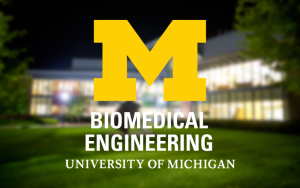Presented By: Biomedical Engineering
BME PhD Defense: Olga M. Wroblewski
Human Skeletal Muscle Units for the Repair of Volumetric Muscle Loss

Volumetric muscle loss (VML) is a common pathological condition caused by traumatic loss of skeletal muscle that exceeds the muscle’s regenerative capabilities and results in functional impairment. Current surgical standards-of-care frequently fail to fully recover contractile function. To address these limitations, our laboratory has developed scaffold-free tissue engineered skeletal muscle units (SMUs) for the treatment of VML. Isolated skeletal muscle stem cells (satellite cells) and fibroblasts are cultured into a confluent cell monolayer before being rolled into a cylindrical 3D construct. Ideally, these SMUs could be engineered from small autogenic muscle biopsies, alleviating the limitations of donor site morbidity and immune rejection seen in current VML treatments. These SMUs are biocompatible, incorporate into surrounding muscle tissue upon implantation, and have shown efficacy to partially repair a 30% VML in rat and sheep models. There are two key challenges that must be resolved to successfully translate our technology to a human cell-sourced model. To date, it has been difficult to grow human cell-sourced SMUs with any noteworthy contractile function. Secondly, many satellite cells are required for SMU fabrication. Any methodology that can optimize the number of cells obtained in a human skeletal muscle biopsy and enhance the functional properties of the resultant muscle tissue will advance SMUs towards clinical use.
Human epidermal growth factor (hEGF), a mitogen, has shown promise enhancing myobundle formation and contractile function in vitro. Prior to this thesis work, the impact of hEGF treatment during the proliferation and differentiation phases of SMU fabrication had yet to be evaluated. We investigated the effects of hEGF on SMU fabrication, structure, and biomechanical function. Our results indicated that hEGF was critical for the development of contractile function in human cell-sourced SMUs.
Due to the small amount of satellite cells present in skeletal muscle, we also sought to optimize our methodologies so that fewer satellite cells are needed to be isolated to fabricate SMUs. Currently, we have been successful at fabricating functional SMUs using lower cell-seeding densities compared to rat and sheep models. By altering the timing of our fabrication protocol and allowing cell cultures to reach >90% confluency in media that promotes proliferation, we found that we could lower starting cell-seeding density by 90% compared to ovine models with no detrimental impact to monolayer development or SMU function.
To further expand the capabilities of satellite cells from a single autogenic skeletal muscle biopsy, we evaluated the impact of in vitro cell proliferation (increasing cell number by cell passaging) on human primary skeletal muscle cells within an engineered skeletal muscle tissue environment. While cell passaging decreased the percentage of myogenic cells in the total cell population, results indicated that human primary skeletal muscle cells can be passaged without negatively impacting the contractile function of a skeletal muscle construct compared to one created with unpassaged cells. A single passage can increase the total cell yield from a human skeletal muscle biopsy fiftyfold compared to cells harvested without a passage.
Overall, this work significantly contributed to the field of skeletal muscle tissue engineering by advancing fabrication methodologies to develop SMUs of appropriate structure and function for human application. We addressed two key limitations in human cell-sourced skeletal muscle tissue engineering by optimizing cell culture conditions to increase the cell yield from a single skeletal muscle biopsy while promoting SMU biomechanical function.
Date: Wednesday, January 12, 2022
Time: 10:00 AM EST
Zoom: https://umich.zoom.us/meeting/register/tJUocu2gqjMpGdelbor8Vj43NvRde859Q-EE
(Zoom link requires prior registration)
Chair: Dr. Lisa Larkin
Human epidermal growth factor (hEGF), a mitogen, has shown promise enhancing myobundle formation and contractile function in vitro. Prior to this thesis work, the impact of hEGF treatment during the proliferation and differentiation phases of SMU fabrication had yet to be evaluated. We investigated the effects of hEGF on SMU fabrication, structure, and biomechanical function. Our results indicated that hEGF was critical for the development of contractile function in human cell-sourced SMUs.
Due to the small amount of satellite cells present in skeletal muscle, we also sought to optimize our methodologies so that fewer satellite cells are needed to be isolated to fabricate SMUs. Currently, we have been successful at fabricating functional SMUs using lower cell-seeding densities compared to rat and sheep models. By altering the timing of our fabrication protocol and allowing cell cultures to reach >90% confluency in media that promotes proliferation, we found that we could lower starting cell-seeding density by 90% compared to ovine models with no detrimental impact to monolayer development or SMU function.
To further expand the capabilities of satellite cells from a single autogenic skeletal muscle biopsy, we evaluated the impact of in vitro cell proliferation (increasing cell number by cell passaging) on human primary skeletal muscle cells within an engineered skeletal muscle tissue environment. While cell passaging decreased the percentage of myogenic cells in the total cell population, results indicated that human primary skeletal muscle cells can be passaged without negatively impacting the contractile function of a skeletal muscle construct compared to one created with unpassaged cells. A single passage can increase the total cell yield from a human skeletal muscle biopsy fiftyfold compared to cells harvested without a passage.
Overall, this work significantly contributed to the field of skeletal muscle tissue engineering by advancing fabrication methodologies to develop SMUs of appropriate structure and function for human application. We addressed two key limitations in human cell-sourced skeletal muscle tissue engineering by optimizing cell culture conditions to increase the cell yield from a single skeletal muscle biopsy while promoting SMU biomechanical function.
Date: Wednesday, January 12, 2022
Time: 10:00 AM EST
Zoom: https://umich.zoom.us/meeting/register/tJUocu2gqjMpGdelbor8Vj43NvRde859Q-EE
(Zoom link requires prior registration)
Chair: Dr. Lisa Larkin